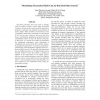35 search results - page 3 / 7 » Improving Quality-of-Control Using Flexible Timing Constrain... |
RTCSA
2006
IEEE
13 years 11 months ago
2006
IEEE
(m,k)-firm constraints have been used to schedule tasks in soft/firm real-time systems under overloaded conditions. In general, they are provided by application designers to guara...
ECOWS
2007
Springer
13 years 11 months ago
2007
Springer
For improved flexibility and concurrent usage existing transaction management models for Web services relax the isolation property of Web service-based transactions. Correctness o...
ASPDAC
2008
ACM
13 years 7 months ago
2008
ACM
This paper proposes a novel Behavioral Synthesis method that improves performance of synthesized circuits utilizing specialized functional units effectively. Specialized functional...
MANSCI
2008
13 years 5 months ago
2008
We study large-scale service systems with multiple customer classes and many statistically identical servers. The following question is addressed: How many servers are required (s...
JVCIR
2008
13 years 5 months ago
2008
In this article we present three key ideas which together form a flexible framework for maximizing user-perceived quality under given resources with modern video codecs (H.264). F...

